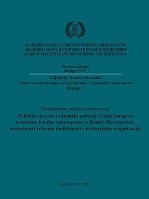MODEL IZBORA SKUPŠTINE GRADA, GRADONAČELNIKA I GRADSKOG VEĆA GRADA BEOGRADA U UPOREDNOJ PERSPEKTIVI
MODEL OF THE ELECTION OF THE CITY ASSEMBLY, MAYOR AND CITY COUNCIL OF THE CITY OF BELGRADE IN A COMPARATIVE PERSPECTIVE
Author(s): Slaviša Orlović
Subject(s): Public Administration, Government/Political systems, Electoral systems
Published by: Akademija Nauka i Umjetnosti Bosne i Hercegovine
Keywords: City of Belgrade; City assembly; Mayor; City Council; City administration; City municipalities;
Summary/Abstract: In this text, I deal with the analysis of the election model of the city assembly, mayor, city council and city municipalities in the City of Belgrade in a comparative perspective. In the introductory part, I point out the theoretical assumptions of local self-government and democracy. Then I look back at European experiences, principles and trends such as subsidiarity, decentralization and regionalism. The city of Belgrade is located within the territorial organization of the Republic of Serbia. In the central part of this work, I deal with the organization of the authorities in Belgrade and the method of elections. The way city authorities are elected affects the character of the local self-government system. Voters evaluate the quality of work of the local self-government as a whole by the work of the first person of the local community. Citizens in the person of the president of the municipality and the mayor personalize the local government – he is the address they turn to for all the problems they have and they expect solutions from him even when the problems are not within the competence of the local administration. He is not only the first among equals, but the local government from which the citizens expect to be operational. Serbia’s experience with the direct election of mayors (2004) produced negative consequences. In dualistic systems presidents of municipalities and mayors depended on the parliamentary majority in the implementation of local politics. Where the parties of the majority in local assemblies and municipal presidents and mayors differed, the work of local self-government was blocked and impeachment proceedings were initiated. In contrast, in the monist system that has been in effect in Belgrade since 2008, the mayor and the city council are subordinate to the representative body of the local community and their actions are conditioned by the will of the majority. It can be concluded that local governments have two “innate advantages” over national states in managing global issues: they have greater legitimacy among those they represent, and they have more flexibility and room for maneuver than national structures. At the same time, the cities are home to a huge concentration of power and wealth, but also great inequalities and poverty.
- Page Range: 166-188
- Page Count: 23
- Publication Year: 2022
- Language: Serbian
- Content File-PDF

